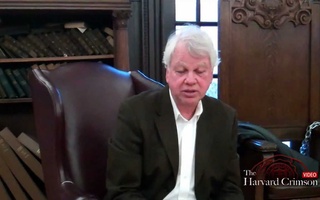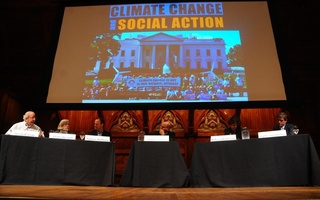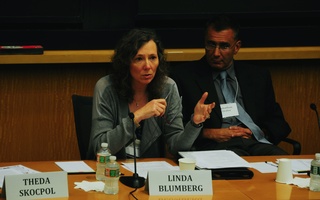Panelists expressed mixed opinions about the success of ongoing protests in Hong Kong at the Institute of Politics on Tuesday evening.
Moderated by Anthony J. Saich, director of the Ash Center for Democratic Governance and Innovation, the IOP forum brought together a Harvard professor, a lawyer based in Hong Kong, and a senior at the College originally from Hong Kong to analyze the ambitions behind recent student demonstrations as well as the Chinese government’s stance on the city-state’s sovereignty.
{shortcode-53b44dc09180e3fcc9318667fb535367e34cfe59}
Saich said he hoped the forum would further conversation on the issue of Hong Kong electoral reform after a decline in coverage of the protests. “We’re now two months into the demonstrations, and as a result, it’s fallen off the front page of the newspapers,” Saich said.
Panelist C. M. Chan, a lawyer currently enrolled in the Kennedy School of Government’s international Mason Fellowship master’s degree program, offered a legal perspective on the Hong Kong question. He noted that, by law, the people of Hong Kong are granted universal suffrage. “It’s actually written very clearly in the constitution,” Chan said.
To bring in personal insight into motives of student protesters, Saich turned to panelist Heather L. Pickerell ’15, founder of the international movement “Wear Yellow for Hong Kong” and a Crimson editorial editor. Originally from Hong Kong, Pickerell said that many people her age did not have an opinion on democracy in Hong Kong until this year. According to Pickerell, the movement was an outpouring of frustration building up among the Hong Kongese.
“Hong Kong is the most unequal society in the world when it comes to socioeconomics,” Pickerell said. “These are longstanding issues, and I think they finally have come to a helm now.”
The panelists and moderator recognized the difficulty of democracy in Hong Kong’s electoral system while, they said, Beijing remains unwilling to concede on the prospect of reform.
“I think [the demonstrations] will have very little impact in Beijing,” Saich said. Pickerell agreed that it is unlikely that China will change its stance. She did, however, express optimism about the younger generation’s political voice in the more distant future.
After the discussion, a member of the audience asked about the protests in light of the 2047 expiration date for China’s agreement to grant autonomy to Hong Kong for fifty years. The panelists, however, did not express too much concern about this potential political obstacle. “I don’t think Hong Kong falls off a political cliff in 2047,” said panelist William C. Kirby, a Harvard professor of China Studies.
Xiaodi Chen, a Chinese instructor for the Harvard Language Program, said she felt the event was informative, but added that she felt more uncertain about Hong Kong’s future after the forum.
“I think I’m a little more pessimistic now,” Chen said. “We don’t know what will happen to Hong Kong, even in 20 or 30 years.”
Read more in University News
Citing Workplace Injuries, DoubleTree Workers Call for Faust MeetingRecommended Articles
-
 Bob Ryan Talks Harvard Basketball
Bob Ryan Talks Harvard Basketball -
 With Faust in Attendance, Professors Advocate Environmental Activism
With Faust in Attendance, Professors Advocate Environmental Activism -
Panel Discusses Challenges of TranslationScholars face an ethically fraught task in translating a text from one language into another, panelists agreed during a Monday afternoon discussion about translation held in Emerson Hall.
-
 Conan: “Give a White Male From Harvard a Freakin' Chance!”
Conan: “Give a White Male From Harvard a Freakin' Chance!” -
 Affiliates Wear Yellow in Solidarity with Hong Kong Protesters
Affiliates Wear Yellow in Solidarity with Hong Kong Protesters -
 Experts Examine Challenges Facing Affordable Care Act
Experts Examine Challenges Facing Affordable Care Act













